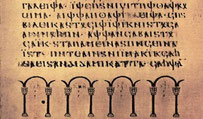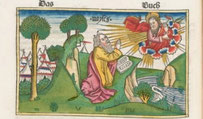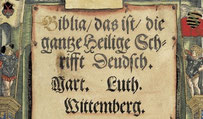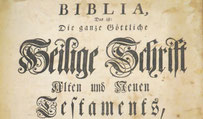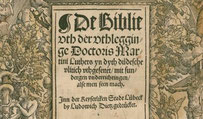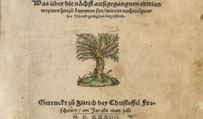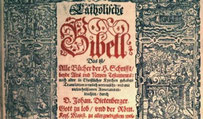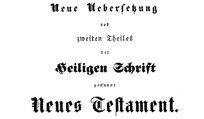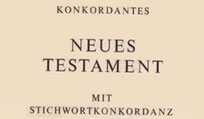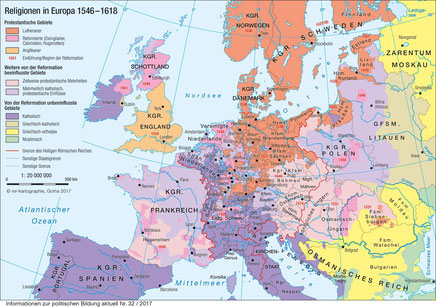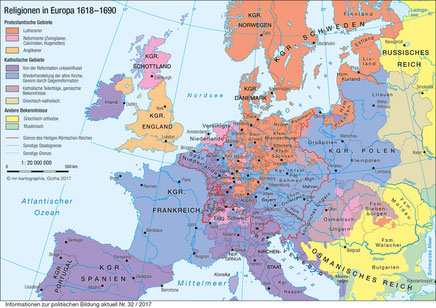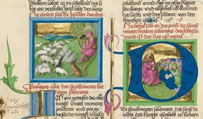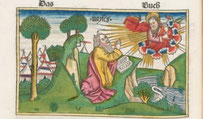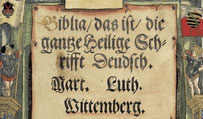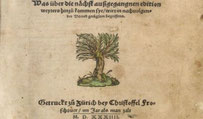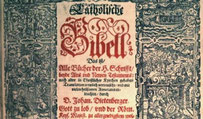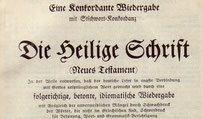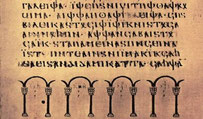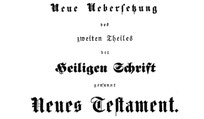- Home
- Aufbau der Bibel
- Fakten zur Bibel
- Historische Bibeln
- Aufbau der Menora
- Historische Menoras
- Auferstehung am Sabbat
- Einleitung
- Definitionen
- Interlinear-Text
- Kirchen-Meinungen
- 1. Kein Sonntag
- 2. Ein Sabbat
- 3. Kein Freitag
- 4. Zwischen-Tag
- 5. Drei Tage und drei Nächte
- 6. Manipulationen
- 7. Alte Bibeln
- Omer
- μια των σαββατων
- Mt-28-1
- Mk 16-2
- Mk 16-9
- Lk 24-1
- Joh 20-1
- Joh 20-19
- Apg 20-7
- 1Kor 16-2
- Lk 18-12
- 7 Sprachen
- Bibel-Ausgaben
- Zusammenfassung
- English
- Info
- Kalender und Feste
- Entrückung
- Video
- English
DEUTSCHE BIBELN - ONLINE - GERMAN BIBLES
Deutschland ist das Land der Bibeln. Es ist ein gesegnetes Land und die in Deutschland begonnene Verbreitung des gedruckten Wortes Gottes wurde zum Segen für die Welt. Es gab bereits vor Luther über 150 deutsche Bibel-Übersetzungen in handschriftlicher Form. Einige davon waren sehr kostbar und mit Farb- und Gold-Malereien verziert. Seit der Erfindung der Druckerpresse ab 1452 durch Johannes Gutenberg, konnte das Evangelium nicht nur in Deutschland, sondern weltweit preisgünstig verbreitet werden. Bereits vor der lateinischen Vulgata (382 n. Chr.) gab es eine germanische Bibel, die Goten-Bibel (350-380 n. Chr.) von Wulfila. Es wurden danach so viele deutsche Bibeln hergestellt, das eine zeitliche Aufgliederung nötig ist: An erster Stelle kommen die alten Handschriften, danach die 18 gedruckten Bibeln vor Luther (Vorlutherische Bibeln), danach die Luther-, die Zürcher- und die niederdeutschen Bibeln, deren ersten Ausgaben alle etwa um die gleiche Zeit erschienen sind. Es folgen die drei katholischen Gegen-Bibeln zu Luther und die sehr vielen Bibel-Drucke nach Luther. (see English translation below)
Links zu den historischen Original-Bibeln, Faksimiles:
Die Reformation und die Bibel-Produktion
Zur Zeit der ersten christlichen Gemeinde (1. Jahrhundert n. Chr.) wurden die Schriftrollen der Bibel immer wieder mit der Hand abgeschrieben und in den Gemeinden und Haushalten verteilt. Da die Manuskripte aus Papyrus oder Tierhäuten bestanden, waren sie nicht lange haltbar und mussten sorgfältig gelagert und immer wieder neu abgeschrieben werden. Es gab überhaupt nur sehr wenige Menschen, die alle 49 Schriftrollen der Bibel zu Verfügung hatten. Schon früh gab es Übersetzungen der griechischen Texte in andere Sprachen. Im Laufe der darauf folgenden Jahrhunderte wurden fast nur noch lateinische Bibeln hergestellt, da die katholische Kirche kein Interesse hatte, dass jeder die Bibel selber lesen und auslegen konnte. Daher war das Bibellesen bis ins Mittelalter meistens nur Priestern vorbehalten. Wycliffe und viele deutsche Übersetzer waren ihrer Zeit schon weit voraus, denn sie stellten Bibeln in der Landessprache her. Es waren aber Handschriften, also viel zu selten und viel zu teuer, so dass sich kaum ein Christ eine Bibel leisten konnte. Zum Abschrieben einer Bibel hat ein Mönch oft ein ganzes Jahr gebraucht. Außerdem war das Schreibmaterial ein Luxusartikel. Das alles machte die Bibeln extrem teuer. Seit der Erfindung des Buchdruckes mit beweglichen Buchstaben durch Johannes Gutenberg aus Mainz, war es ab 1452 möglich, Bibeln in großen Stückzahlen und somit preiswert zu produzieren. Die ersten Drucke waren jedoch in Latein, so dass sie das Volk wieder nicht verstehen konnte. Es gab zwar 18 gedruckte deutsche Bibeln vor Luther, deren Erwerb war jedoch für normale Bürger unmöglich. Durch durch die einsetzende Reformation änderten sich die Verhältnisse schlagartig, denn das Ziel der Reformatoren war es, dass jeder seine eigene Bibel in seiner eigenen Muttersprache lesen kann. Leider sind sich die meisten Christen auf der Welt nicht bewusst, welch ein Privileg es ist, eine eigene Bibel besitzen zu dürfen. Milliarden von Menschen vor uns konnten das Wort Gottes in vollem Umfang niemals lesen.
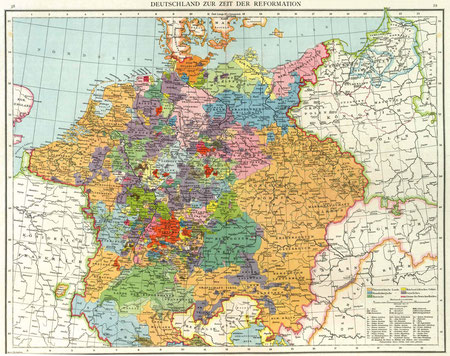
Die Reformation begann ab 1517 im Zentrum Europas in dem damaligen „Heiligen Römischen Reich Deutscher Nation“ (Wikipedia). Es war der Herrschafts-Bereich der römisch-deutschen Kaiser vom Spätmittelalter (also ca. 1250 bis 1500) bis 1806. Die Grenzen wurden im Laufe der Geschichte mehrfach verschoben und waren von den jeweiligen Päpsten anerkannt. Das Deutsche Reich war kein Nationalstaat wie bei den Nachbarstaaten Frankreich oder Polen, sondern es bestand aus zahlreichen einzelnen meist deutschsprachigen Stammes-Herzogtümern, die untereinander konkurrierten. Zudem gab keine einheitliche Sprache, sondern viele nieder-, mittel- und oberdeutsche Dialekte. Im Westen wurde zusätzlich auch Französisch, in der Gegend um Prag Tschechisch und in den östlichen Randbereichen auch Polnisch gesprochen. (Quelle der Karte: Wikipedia, Link2).
Für die Gebildeten war Latein in ganz Europa über Jahrhunderte hindurch die wichtigste Wirtschafts-, Medizin-, Wissenschafts- und Kirchensprache. Daher gab es bis zur Reformation die Bibel meist nur in Form der Vulgata, während die deutschsprachigen Bibeln nur kleinen erlesenen Kreisen wie Königen oder Priestern (Klöstern) vorbehalten waren. Das einfache Volk konnte die Bibel bis zur Reformation also gar nicht lesen und war auf die Auslegung durch die Theologen angewiesen. Diese hatten aber oft eigene Interessen und lehrten nicht die Nachfolge Jesu.
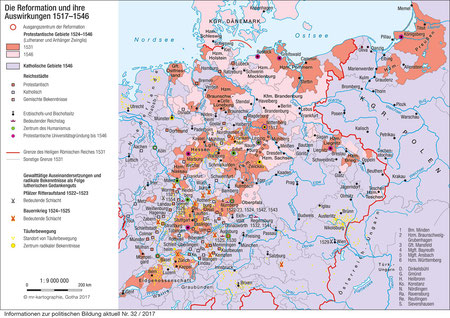
Die einzelnen Fürstentümer des Reiches waren sich in Bezug auf die Religions-Zugehörigkeit uneins. Der Landesfürst bestimmte oft die Religion und das Volk musste sich diesem weitgehend anschließen. Die Reformation hatte zur Folge, dass die Herstellung der Bibeln in einer Landessprache nicht nur in Deutschland, sondern auch in ganz Europa extrem gefördert wurde. Drucker aus Deutschland gingen nach Schweden, Dänemark, Polen und in weitere europäische Länder, wo allerlei Schriften erstellt wurden. Was bisher seit 1.500 Jahren völlig undenkbar war: nun konnten sich immer mehr Menschen eine eigene Bibel in der Muttersprache leisten (Quelle der Karte: DPB, ©mr-kartographie).
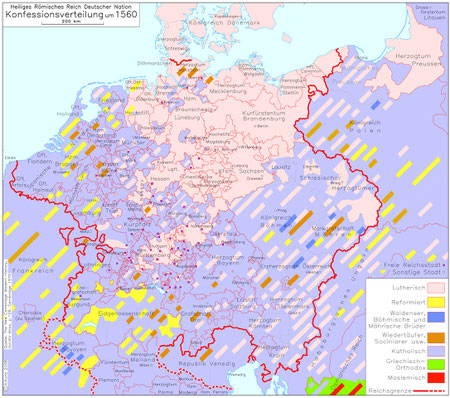
Die norddeutschen Gebiete folgten der reformatorischen Bewegung. Ihr Ziel war es, wieder zu den Ursprüngen der christlichen Lehre zu gelangen. Die süddeutschen Länder (insbesondere Bayern) weigerten sich den neuen Glauben anzunehmen. Sie verteidigten die katholischen Lehren. Für sie war die Fortführung der bisherigen Traditionen wichtiger.
Der spanische König und späterer deutscher Kaiser Karl V. (*1500, †1558; Wikipedia), der 1530 vom Papst Clemens VII. (Giulio de Medici; *1478, †1534; Wikipedia) gekrönt wurde, versuchte mit aller Macht eine Glaubensspaltung zu verhindern und die katholische Glaubenseinheit durch Anwendung von Gewalt zu bewahren. Dies ist ihm nicht gelungen und es kam zum Fürstenaufstand und zu schrecklichen Glaubenskriegen, die erst mit dem Augsburger Religionsfrieden im Jahr 1555 ein vorläufiges Ende fanden. (Quelle der Karte: IEG-MAPS).
Martin Luther (*1483, †1546) wollte keine Spaltung der katholischen Kirche, sondern die Missstände in der Kirche beseitigen und sie reformieren (lat. reformatio bedeutet Erneuerung). Doch statt zur Veränderung, kam es zur ungewollten Kirchenspaltung, bei der durch Gewalt viel Blut vergossen wurde. Auch Luther wurde exkommuniziert und verfolgt und viele seiner reformatorischen Freunde in Europa wurden auf dem Scheiterhaufen verbrannt. Da er jedoch unter dem persönlichen Schutz eines weltlichen Fürsten stand, konnte er den Strafen der katholischen Kirche entgehen. Nicht allein seine deutsche Bibel-Übersetzung war ein Problem, sondern seine offene Kritik an der katholischen Kirche, am Zölibat, den Ablassbriefen und an der Heiligen- und Marienverehrung. Ihn kümmerten nicht kirchliche Lehrmeinungen und Dogmen, für ihn war das biblische Wort maßgebend.
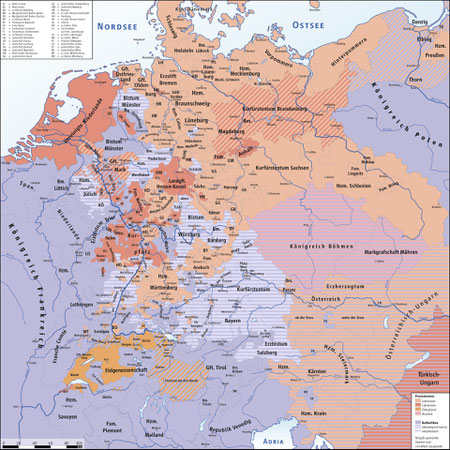
Luther bezeichnete den Papst als den Antichristen. Der Papst wiederum nannte Luther einen Ketzer und Antichristen. Durch die Reformation kam es nicht nur zu Konflikten und Kriegen zwischen Fürstentümern und Ländern, sondern auch innerhalb einzelner Familien.
Die vielen historischen und neuen Karten zeigen das stark in einzelne Fürstentümer zersplitterte „Heilige Römische Reich Deutscher Nation“ und seine religiöse Ausrichtung. Dabei ist zu beachten, dass sich die Situation auch kurzfristig ändern konnte, insbesondere im Zuge der Gegen-Reformation. Oberschlesien war z.B. kurzzeitig protestantisch, dann wieder katholisch.
Der 2. Weltkrieg hatte schreckliche Folgen, denn es kam zur Vertreibung von 12 Millionen Deutschen aus den ehemaligen Ostgebieten Pommern Preußen und Schlesien. Die nachrückenden (und oft selbst auch vertriebenen) Polen waren dagegen meist katholisch. (Quelle der Karte: Wikipedia)
Die Massenproduktion der Bibeln beginnt
Seit der Erfindung der Druckerpresse mit beweglichen Buchstaben durch Johannes Gutenberg aus Mainz, wurde eine massenhafte Vervielfältigung an bis dahin kaum zu gelangende Literatur möglich. Da die ab September 1522 erschienene Luther-Bibel (NT, Vollbibel 1534) vielfach nachgedruckt wurde, musste auch die katholische Kirche nachziehen und ihren Mitgliedern eine eigene katholische Bibel anbieten. Damit sollte verhindert werden, dass auch Katholiken in den Besitz einer protestantischen Schrift kommen können. Es gab gleich 3 offizielle katholische Gegen-Bibeln (oder Korrektur-Bibeln) und es kam zu einem regelrechten Wettstreit in der Verbreitung des Wortes Gottes. Das wurde durch die Cansteinsche Bibelanstalt, die erste Bibelanstalt der Welt, erst recht begünstigt. In Deutschland wurde das Verbreiten des Evangeliums stark gefördert und die dafür benötigte Drucktechnik wurde in die ganze Welt exportiert. Die folgenden Abbildungen stammen von der Bundeszentrale für politische Bildung (© mr-kartographie): Link
Der Segen und die Warnungen der Bibel
Heute können wir nicht nur eine, sondern hunderte von Bibeln haben, denn sehr viele Original-Ausgaben sind in digitaler Form als Faksimile im Internet kostenlos erhältlich. Es sind historische Zeugen einer sehr bewegenden Zeit. Dennoch verstehen viele die Bibel nicht, denn sie lesen nicht darin. Ein wahrer Christ ist auch nur derjenige, der Jesus Christus im Weg der Liebe nachfolgt. Wer sich aber Christ nennt, Ehebruch betreibt, anderen Gewalt antut und lügt, der verleugnet Jesus mit seinen Taten. Ein Christ ist auch nur derjenige, der die Liebe und den Geist Gottes hat. "Wenn aber jemand Christi Geist nicht hat, der ist nicht sein" (Röm 8,9). Das einzige zuverlässige Erkennungszeichen eines Christen ist die Liebe. Sie ist die Auswirkung des Heiligen Geistes, denn Gott ist die Liebe selbst. Allein der Besitz einer Bibel wird niemanden vor dem ewigen Tod retten. Im Buch des Lebens stehen nur die Namen der Gerechten drin, die nicht nur in der Bibel lesen, sondern auch den Weg der Liebe gehen.
Das Ursprungsland der Bibel ist Israel. Das Alte Testament wurde auf Hebräisch verfasst und alle griechischen neutestamentlichen Schriften wurden von Menschen geschrieben, die aus dem hebräischen Volk stammten (vgl. Verfasser). Dies ist eine Tatsache, die nur wenigen Christen wirklich bewusst ist. Daher ist der Antisemitismus auch immer gegen das Christentum gerichtet, denn ohne die Hebräer hätten wir das Wort Gottes nicht.
Jesus sagte: "Alles nun, was ihr wollt, dass euch die Leute tun sollen, das tut ihnen auch! Das ist das Gesetz und die Propheten. Geht hinein durch die enge Pforte. Denn die Pforte ist weit und der Weg ist breit, der zur Verdammnis führt, und viele sind's, die auf ihm hineingehen. Wie eng ist die Pforte und wie schmal der Weg, der zum Leben führt, und wenige sind's, die ihn finden! Seht euch vor vor den falschen Propheten, die in Schafskleidern zu euch kommen, inwendig aber sind sie reißende Wölfe. An ihren Früchten sollt ihr sie erkennen. Kann man denn Trauben lesen von den Dornen oder Feigen von den Disteln? So bringt jeder gute Baum gute Früchte; aber ein fauler Baum bringt schlechte Früchte. Ein guter Baum kann nicht schlechte Früchte bringen und ein fauler Baum kann nicht gute Früchte bringen. Jeder Baum, der nicht gute Früchte bringt, wird abgehauen und ins Feuer geworfen. Darum: an ihren Früchten sollt ihr sie erkennen. Es werden nicht alle, die zu mir sagen: Herr, Herr!, in das Himmelreich kommen, sondern die den Willen tun meines Vaters im Himmel. Es werden viele zu mir sagen an jenem Tage: Herr, Herr, haben wir nicht in deinem Namen geweissagt? Haben wir nicht in deinem Namen böse Geister ausgetrieben? Haben wir nicht in deinem Namen viele Wunder getan? Dann werde ich ihnen bekennen: Ich habe euch noch nie gekannt; weicht von mir, ihr Übeltäter!" (Mt 7,12-23)
Und heute?
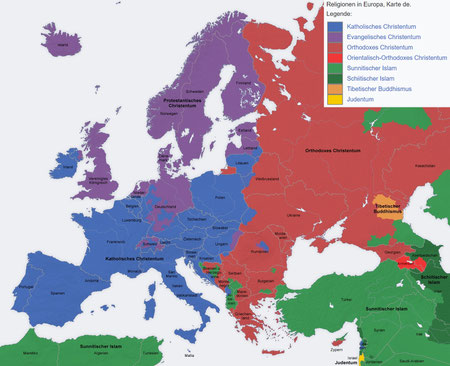
Der Protestantismus hat sich im Laufe der Jahrhunderte stark verändert und ist lau geworden. Die katholische Kirche hat in den meisten Ländern an Einfluss gewonnen. Viele nennen sich zwar "Christen", wissen aber gar nicht, was dies überhaupt bedeutet. In muslimischen Ländern werden Bibeln zunehmend verboten; allein der Besitz einer Bibel wird mit Folter und Gefängnis bestraft. Im Kontrast dazu können in Deutschland und in jedem europäischen Land viele Bibeln sehr leicht erworben werden. Aber Tatsache ist, dass sich nur wenige wirklich für das Wort Gottes und die Nachfolge Jesu interessieren. Die meisten leben einfach vor sich hin und es kümmert sie nicht, was Gott zu sagen hat. Sie wollen keine Autorität über sich, die ihnen vorschreibt was sie zu tun und zu lassen haben. Ehebruch, Scheidungen, zerüttete Familien, Gewalt, Kriege usw. sind die Folgen. (Quelle der Abbildung, verändert: Wikipedia)
Gerade in der heutigen Zeit ist die Bibel so wichtig wie noch niemals zuvor. Denn sie zeigt den wahren Weg der Liebe, ein Weg ohne Gewalt, ohne Betrug und ohne Lüge. Sie ist das einzige Licht, dass wir in dieser dunklen Welt haben. Doch wie viele Menschen auf der Welt sind ernsthaft am Wort Gottes interessiert? Gott hat den Menschen die Bibel gegeben, aber die Menschen wollen sie nicht.
GERMAN BIBLES - Online
(Translation of the text above). Germany is the land of the Bibles. It is a blessed country and the spreading of the printed Word of God started in Germany became a blessing for the world. Even before Luther, there were over 150 German Bible translations in handwritten form. Some of them were very precious and decorated with color and gold paintings. Since the invention of the printing press in 1452 by Johannes Gutenberg from Mainz (Germany), the Gospel could be spread not only in Germany, but worldwide at a reasonable price. Even before the Latin Vulgate (382 AD) there was a Germanic Bible, the Gothic Bible of Wulfila (350-380 AD). There are so many old German Bibles that a chronological breakdown is necessary: first the old manuscripts, then the 18 printed Bibles before Luther, i.e. the Pre-Lutheran Bibles, then the Luther Bible, the Zurich Bible and Lower German Bibles, the first editions of which all appeared around the same time. Then follow the three Catholic counter-bibles to Luther, the Correction Bibles and the many Bibles after Luther.
The Reformation and Bible Production
At the time of the first Christian church (1st century A.D.) the scrolls of the Bible were repeatedly copied by hand and distributed in churches and households. Since the manuscripts consisted of papyrus or animal skins, they were not durable for long and had to be stored carefully and copied again and again. There were very few people at all who had all the 49 scrolls of the Bible at their disposal. Already early there were translations of the Greek texts into other languages. In the course of the following centuries, almost only Latin Bibles were produced, since the Catholic Church had no interest in everyone being able to read and interpret the Bible themselves. Therefore, Bible reading was mostly reserved for priests until the Middle Ages. Wycliffe and many German translators were already far ahead of their time, because they produced Bibles in the national language. But they were manuscripts, far too rare and far too expensive, so that hardly any Christian could afford a Bible. It often took a monk a whole year to copy a Bible. In addition, the writing material was a luxury article. All this made the Bibles extremely expensive. Since the invention of printing with movable letters by Johannes Gutenberg (Wikipedia) from Mainz (Wikipedia), it was possible from 1452 to produce Bibles in large numbers and thus inexpensively. However, the first prints were in Latin, so that the people could not understand them again. There were 18 printed German Bibles before Luther, but their purchase was impossible for ordinary citizens. With the beginning of the Reformation the situation changed abruptly, because the goal of the reformers was that everyone could read his own Bible in his own mother tongue. Unfortunately, most Christians around the world are not aware of the privilege of having their own Bible. Billions of people before us could never fully read the Word of God.
The Reformation began in 1517 in the centre of Europe in the then "Holy Roman Empire of the German Nation" (Wikipedia). It was the domain of the Roman-German emperors from the late Middle Ages (about 1250 to 1500) to 1806. The borders were shifted several times in the course of history and were recognized by the respective popes. The German Empire was not a nation state like the neighbouring states France or Poland, but consisted of numerous individual, mostly German-speaking tribal duchies, which competed with each other. In addition, there was no uniform language, but many dialects of Lower, Middle and Upper German. French was also spoken in the West, Czech in the area around Prague and Polish in the eastern border areas.
For the educated, Latin was the most important economic, medical, scientific and ecclesiastical language throughout Europe for centuries. Therefore, until the Reformation, the Bible was usually only in the form of the Vulgate, while the German-language Bibles were reserved for small, select circles such as kings or priests (monasteries). The common people were therefore unable to read the Bible until the Reformation and were dependent on the interpretation of the theologians. However, they often had their own interests and did not teach the discipleship of Jesus.
The individual principalities of the empire were at odds with each other with regard to religious affiliation. The sovereign often determined the religion and the people had to follow it to a large extent. As a result of the Reformation, the production of Bibles in one national language was extremely promoted not only in Germany but also throughout Europe. Printers from Germany went to Sweden, Denmark, Poland and other European countries, where all kinds of writings were produced. What had been completely unthinkable for 1,500 years: now more and more people could afford their own Bible in their mother tongue. The North German territories followed the Reformation movement. Their aim was to return to the origins of Christian doctrine. The southern German states (especially Bavaria) refused to accept the new faith. They defended the Catholic teachings. For them the continuation of the previous traditions was more important.
The Spanish king and later German emperor Charles V (*1500, †1558; Wikipedia), who was crowned in 1530 by Pope Clement VII (*1500, †1534; Wikipedia), tried with all his might to prevent a split of faith and to preserve the Catholic unity of faith through the use of force. He did not succeed in this and there was an uprising of the aristocratic princes and terrible wars of faith, which only came to a temporary end with the "Peace of Augsburg" in 1555 (Wikipedia).
Martin Luther (*1483, †1546; Wikipedia) did not want to divide the Catholic Church, but to eliminate the grievances in the Church and reform it (Latin reformatio means renewal). But instead of change, there was an unwanted division of the church, in which much blood was shed by violence. Luther was also excommunicated and persecuted, and many of his Reformation friends in Europe were burned at the stake. However, being under the personal protection of a secular prince, he was able to escape the punishments of the Catholic Church. Not only his German translation of the Bible was a problem, but also his open criticism of the Catholic Church, celibacy, letters of indulgences and the worship of saints and Mary. He did not care about church doctrines and dogmas, for him the biblical word was decisive.
Luther called the Pope the Antichrist. The Pope in turn called Luther a heretic and Antichrist. The Reformation did not only lead to conflicts and wars between principalities and countries, but also within individual families. The many historical and new maps show the "Holy Roman Empire of the German Nation", strongly fragmented into individual principalities, and its religious orientation. It should be noted that the situation could also change at short notice, especially in the course of the Counter-Reformation. Upper Silesia, for example, was Protestant for a short time, then Catholic again. The Second World War had terrible consequences, as 12 million Germans were expelled from the former eastern territories of Pomerania, Prussia and Silesia. In contrast, the Poles who followed (and were often expelled from Eastern Europe themselves) were mostly Catholic.
Mass production of the Bibles begins
Since the invention of the printing press with movable letters by Johannes Gutenberg, a mass duplication of literature that had hardly been possible until then has become possible. Since the Luther Bible, published in September 1522, was reprinted many times, the Catholic Church also had to follow suit and offer its members its own Catholic Bible. This was to prevent Catholics from coming into possession of a Protestant Scripture. There were 3 official Catholic counter-Bibles (or correction-Bibles) and there was a real competition in the spreading of the Word of God. This was even more favoured by the Canstein Bible Institute (Wikipedia), the first Bible Institute in the world. In Germany the spreading of the gospel was strongly promoted and the necessary printing technology was exported to the whole world.
The Blessings and Warnings of the Bible
Today we can have not only one, but hundreds of Bibles, because many original editions are available in digital form as facsimiles free of charge on the Internet. They are historical witnesses of a very moving time. Nevertheless, many do not understand the Bible because they do not read it. A true Christian is only the one who follows Jesus Christ in the way of love. But anyone who calls himself a Christian, commits adultery, does violence to others and lies, denies Jesus with his actions. A Christian is also only the one who has the love and the Spirit of God. "If anyone does not have the Spirit of Christ, he does not belong to him" (Rom 8:9). The only reliable sign of a Christian is love. It is the effect of the Holy Spirit, for God is love itself. The possession of a Bible alone will not save anyone from eternal death. The Book of Life contains only the names of the righteous who not only read the Bible, but also walk the path of love.
The country of origin of the Bible is Israel. The Old Testament was written in Hebrew and all Greek New Testament writings were written by 8 people from the Hebrew people (see Structure of the Bible). This is a fact that few Christians are really aware of. Therefore, anti-Semitism is always directed against Christianity, because without the Hebrews we would not have the Word of God.
Jesus said: "Therefore all things whatsoever ye would that men should do to you, do ye even so to them: for this is the law and the prophets. Enter ye in at the strait gate: for wide is the gate, and broad is the way, that leadeth to destruction, and many there be which go in thereat: Because strait is the gate, and narrow is the way, which leadeth unto life, and few there be that find it. Beware of false prophets, which come to you in sheep's clothing, but inwardly they are ravening wolves. Ye shall know them by their fruits. Do men gather grapes of thorns, or figs of thistles? Even so every good tree bringeth forth good fruit; but a corrupt tree bringeth forth evil fruit. A good tree cannot bring forth evil fruit, neither can a corrupt tree bring forth good fruit. Every tree that bringeth not forth good fruit is hewn down, and cast into the fire. Wherefore by their fruits ye shall know them. Not every one that saith unto me, Lord, Lord, shall enter into the kingdom of heaven; but he that doeth the will of my Father which is in heaven. Many will say to me in that day, Lord, Lord, have we not prophesied in thy name? and in thy name have cast out devils? and in thy name done many wonderful works? And then will I profess unto them, I never knew you: depart from me, ye that work iniquity" (Mt 7:12-23, KJV)
And how is it today?
Protestantism has changed greatly over the centuries and has become lukewarm. The Catholic Church has gained influence in most countries. Although many call themselves "Christians", they do not know what this means at all. In Muslim countries Bibles are increasingly forbidden; only the possession of a Bible is punished with torture and imprisonment. In contrast, many Bibles can be acquired very easily in any European country. But the fact is that few really care about the Word of God and the discipleship of Jesus. Most simply live by themselves and don't care what God has to say. They don't want any authority over themselves that tells them what to do and what not to do. Adultery, divorces, broken families, violence, wars etc. are the consequences.
The Bible is more important today than ever before. For it shows the true way of love, a way without violence, without fraud and without lies. It is the only light we have in this dark world. But how many people in the world are seriously interested in the Word of God? God gave people the Bible, but people do not want it.
Links to the original Bibles:
